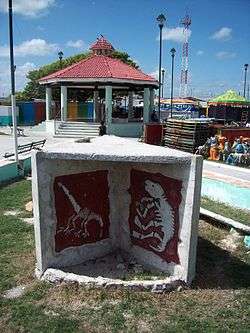Chicxulub, Yucatán
| Chicxulub | |
|---|---|
|
Stele over the meteorite that hit the Earth 66 Million years ago killing the dinosaurs | |
|
Location of Chicxulub in Yucatán | |
| Mexican state | Yucatán |
Chicxulub (Mayan pronunciation: [tʃʼikʃuluɓ] Ch’ik Xulub) is a town, and surrounding municipality of the same name, in the Mexican state of Yucatán.
At the census of 2005, the town had a population of 5,052 people.
Chicxulub is most famous for being near the geographic center of the Chicxulub crater, an impact crater discovered by geologists on the Yucatán Peninsula and extending into the ocean. It was created by the impact some 66 million years ago of the Chicxulub impactor, an asteroid or comet which caused[1] the Cretaceous–Paleogene extinction event, which led to the demise of the dinosaurs. The coastal village (or puerto) of Chicxulub, 6 km east of the nearest town, Progreso, lies almost exactly on the geographic center of the crater.
The name Chicxulub is Yucatec Maya language, where ch’ik means "flea" or "tick", and xulub’ means "devil, demon, or horns".[2] In The Chronicle of Chac Xulub Chen, Nakuk Pech says that the original name of the town (Chac Xulub Chen) means "the well of the great horns," and that "Chic Xulub" may have been a play on words, as it is an idiom for cuckolding.[3]
References
- ↑ "International Consensus — Link Between Asteroid Impact and Mass Extinction Is Rock Solid". Lunar and Planetary Institute. 2010-03-04. Retrieved 2014-11-27.
- ↑ Victoria Bricker, A Dictionary of The Maya Language As Spoken in Hocaba, Yucatan
- ↑ Pech, Nakuk (1562) The Chronicle of Chac Xulub Chen.
External links
- Link to tables of population data from Census of 2005 INEGI: Instituto Nacional de Estadística, Geografía e Informática
- Google Maps
Coordinates: 21°17′42″N 89°36′18″W / 21.295°N 89.605°W
